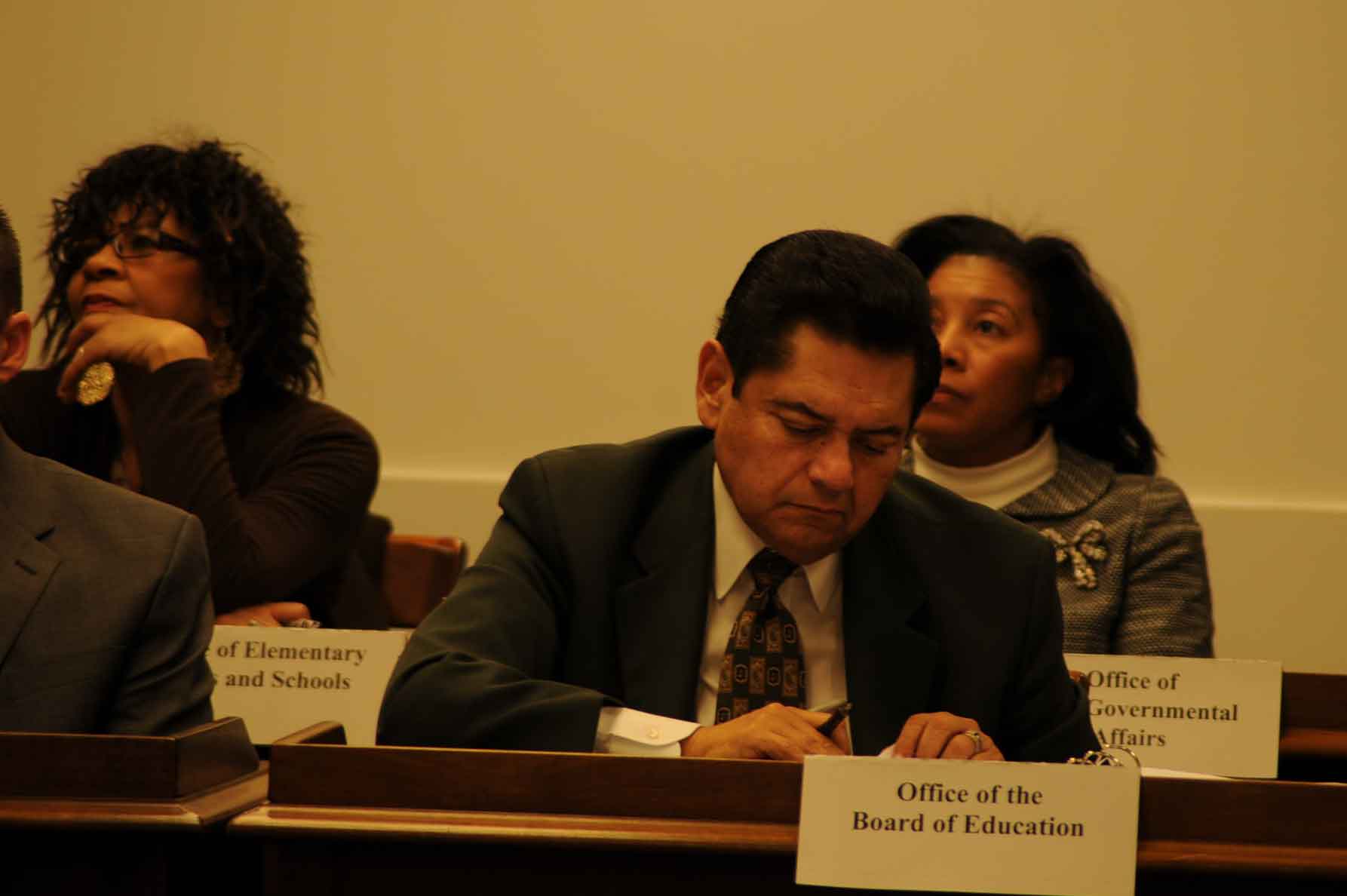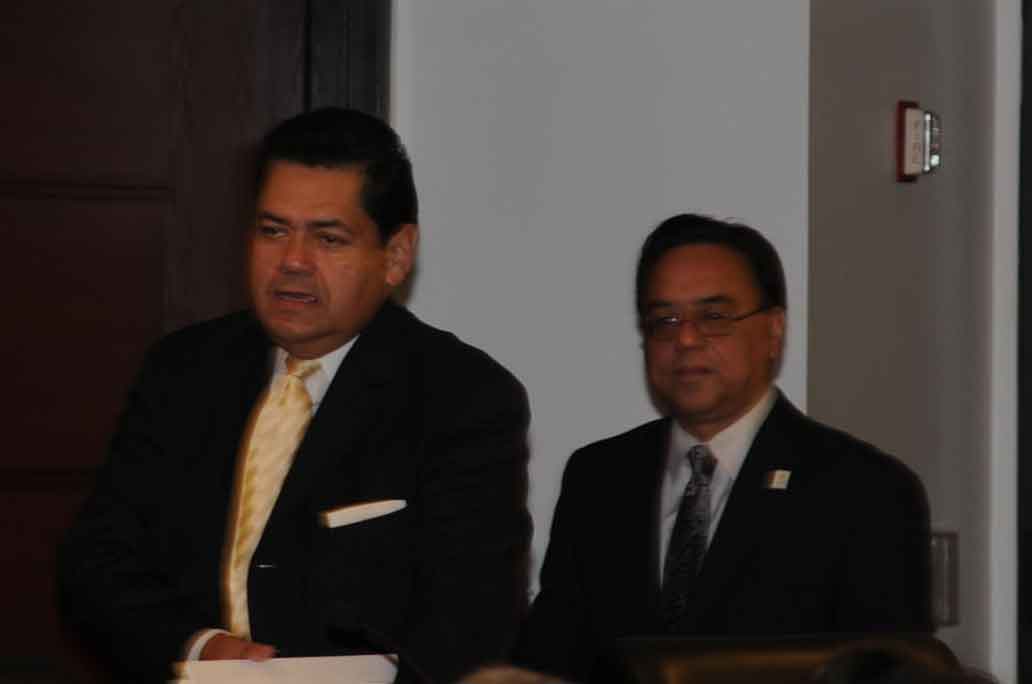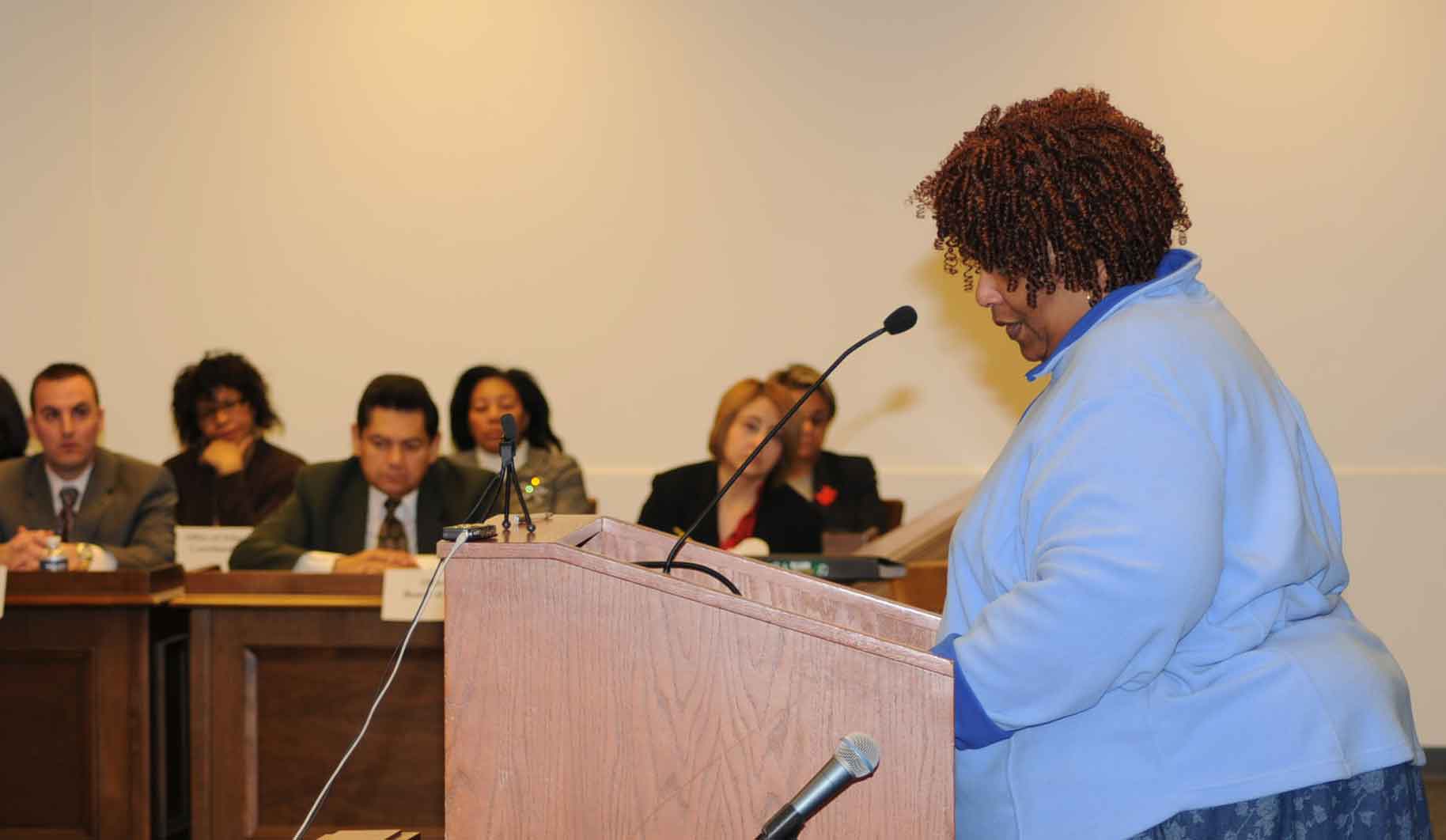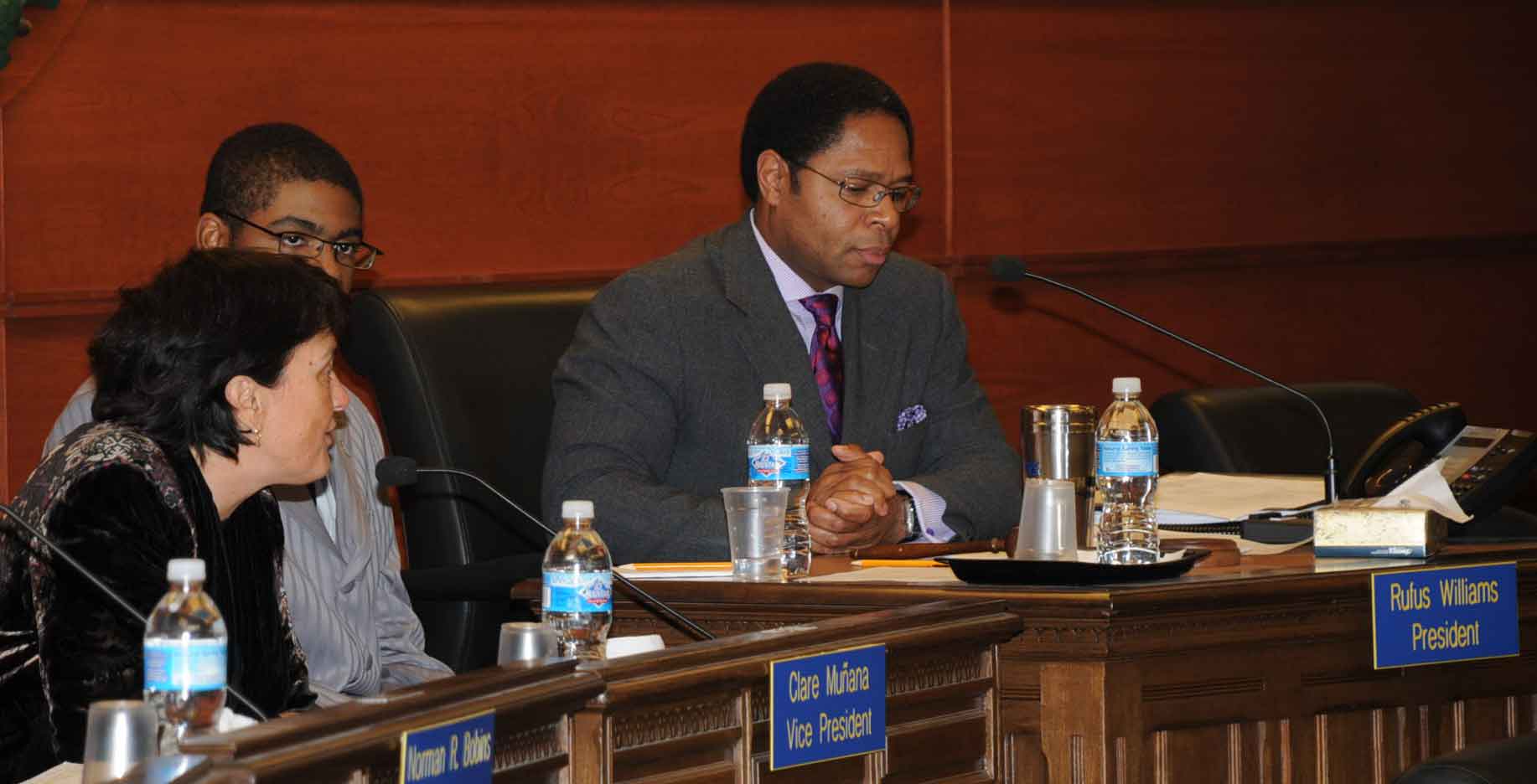Board member attends first 'Turnaround' hearing, gets earful from parents, teachers and principal of Dulles Elementary School
For the first time in history, a member of the Chicago Board of Education attended one of the Board's hearings on a school scheduled for so-called "turnaround" and listened to every speaker who spoke out on behalf of a targeted school.
 On February 5, 2009, Chicago Board of Education member Alberto Carrero attended the first of the six 'turnaround' hearings scheduled as part of this year's actions against Chicago's public schools under the Renaissance 2010 program. Carrero, taking notes above, heard CPS officials testify that 42 schools could have been targeted for 'turnaround' this school year based on CPS criteria. Carrero also heard the testimony from more than a dozen parents, teachers, and administrators at Dulles Elementary School, one of six schools targeted for so-called 'turnaround' (which, as CPS officials noted in their testimony, is really reconstitution). Substance photo by George N. Schmidt. Chicago Board of Education member Alberto Carrero, an officer of Banco Popular, sat through the entire hearing on the proposed "turnaround" of Dulles Elementary School (6311 S. Calumet) between 3:00 p.m. and 5:00 p.m. on Thursday, February 5, 2009. During the 2007-2008 school year, no member of the Board of Education attended any of the hearings. Despite that, the board voted unanimously and without debate on February 27, 2008, to approve the changes in schools recommended by then-CEO Arne Duncan. These changes included the "turnaround" of four elementary schools (Carpenter, Fulton, Howe, and Morton) and two high schools (Harper and Orr). The "turnaround" was put into place in June 2008, when the Board fired all of the staffs of each of the targeted schools. Carrero was one of those who voted in favor of the turnaround at that time.
On February 5, 2009, Chicago Board of Education member Alberto Carrero attended the first of the six 'turnaround' hearings scheduled as part of this year's actions against Chicago's public schools under the Renaissance 2010 program. Carrero, taking notes above, heard CPS officials testify that 42 schools could have been targeted for 'turnaround' this school year based on CPS criteria. Carrero also heard the testimony from more than a dozen parents, teachers, and administrators at Dulles Elementary School, one of six schools targeted for so-called 'turnaround' (which, as CPS officials noted in their testimony, is really reconstitution). Substance photo by George N. Schmidt. Chicago Board of Education member Alberto Carrero, an officer of Banco Popular, sat through the entire hearing on the proposed "turnaround" of Dulles Elementary School (6311 S. Calumet) between 3:00 p.m. and 5:00 p.m. on Thursday, February 5, 2009. During the 2007-2008 school year, no member of the Board of Education attended any of the hearings. Despite that, the board voted unanimously and without debate on February 27, 2008, to approve the changes in schools recommended by then-CEO Arne Duncan. These changes included the "turnaround" of four elementary schools (Carpenter, Fulton, Howe, and Morton) and two high schools (Harper and Orr). The "turnaround" was put into place in June 2008, when the Board fired all of the staffs of each of the targeted schools. Carrero was one of those who voted in favor of the turnaround at that time.
Huberman changes Duncan strategy
One of the things that Carrero heard was the abrupt change in strategy implemented by CPS officials since the proposal to reconstitute Dulles (and fire its entire staff) was first announced one month ago.
At the February 5 hearing, CPS officials announced that they were withdrawing their proposal to place the "turnaround" of Dulles in the hands of a corporate contractor know as "Chicago RISE". Chicago RISE was formed by Chicago International Charter Schools (CICS) and approved as a "turnaround" vendor on the recommendation of former Chicago Schools CEO Arne Duncan in October 2008. In January 2009, just before he left Chicago to become U.S. Secretary of Education after being appointed by President Barack Obama, Duncan has proposed the "turnaround" of Dulles under the auspices of Chicago RISE. For reasons which were not explained at the hearing attended by Board member Carrero, Chicago RISE was withdrawn from the proposal to reconstitute Dulles and the Academy for Urban School Leadership (AUSL) was put in its place.
CPS officials told the hearing officer, attorney Michael Hernandez, that the AUSL turnaround process would require that the entire staff of Dulles be fired and replaced with AUSL-trained "turnaround" teachers and other specialists. David Pickens, who gave one of the reports for the new administration of new CEO Ron Huberman, noted that AUSL schools are all union schools. CICS schools are charter schools and have vigorously resisted unionization of their staffs. Despite the recommendation by Arne Duncan that CICS become a potential "turnaround" contractor, CICS has not track record of doing "turnaround." The controversial AUSL claim that it has successfully "turned around" Sherman ("School of Excellence") and Harvard ("School of Excellence") -- both praised by Mayor Richard M. Daley -- has never been independently demonstrated with the use of outside experts.
Daley appointee
 Chicago Board of Education members Alberto Carrero (left) and Tariq Butt (right) arriving at the January 27, 2009, meeting of the Chicago Board of Education. Both men are businessmen, Carrero in banking, Butt in the medical industry. The Daley administration has been careful to maintain perfect "diversity" in its selection of members of the Chicago Board of Education since Daley was granted the power to appoint the Board without outside consultation or interference in 1995. Substance photo by George N. Schmidt.Like the other six members of the Chicago Board of Education, Carrero was appointed by Daley.
Chicago Board of Education members Alberto Carrero (left) and Tariq Butt (right) arriving at the January 27, 2009, meeting of the Chicago Board of Education. Both men are businessmen, Carrero in banking, Butt in the medical industry. The Daley administration has been careful to maintain perfect "diversity" in its selection of members of the Chicago Board of Education since Daley was granted the power to appoint the Board without outside consultation or interference in 1995. Substance photo by George N. Schmidt.Like the other six members of the Chicago Board of Education, Carrero was appointed by Daley.
Previously since the hearings on this year's school changes began (with a hearing on the proposal to close Davis Developmental and Las Casas Occupational schools) on January 26, only one member of the Board of Education had attended even a small part of the hearings.
Board president Rufus Williams sat with staff for about an hour during the January 29 proposas to close South Chicago Elementary School. Williams sat in the audience section of the Board chambers at 125 S. Clark St., where the hearings have been taking place since January 26. Williams has not returned for any of the hearings since.
Board member Clara Munana sat in the hearing room prior to one of the earlier hearings, but left before the hearing began.
Board members Norman Bobins, Roxanne Ward, Tariq Butt, and Peggy Davis -- all Daley appointees -- have not attended any of the hearings. All served on the Board of Education last year, when the controversial school closings and turnarounds were proposed by Arne Duncan and approved on February 27, 2008, by a unanimous vote of the Board, without discussion or debate.
'Turnaround' is really Reconstitution
One of the things Carrero heard was a bit of legal hair splitting by CPS officials.
Although the Duncan administration referred to the process it began last school year as "turnaround", what the Board voted to do on February 27, 2008, was actually Reconstitution. The corporate "turnaround" jargon used by Duncan has no basis in Illinois law, so when the Board was asked to vote last school year on the proposal to change Carpenter, Fulton, Howe, and Morton elementary schools and Harper and Orr high schools, the Board actually voted not to "turnaround" those schools, but to reconstitute them.
 While Chicago Board of Education member Alberto Carrero sits without expression in the background, Rolanda Mitchell, a veteran sixth grade teacher at Chicago's Dulles Elementary School, testifies about the huge problems facing the children who attend Dulles and the hard work of the staff. Under the proposed reconstitution of Dulles, all of the members of the school's current staff -- from teachers and principals to custodial workers and lunchroom personnel -- would be fired in June and a new staff put into the school under the Academy for Urban School Leadership (AUSL), the so-called 'turnaround specialists' of Chicago's public schools. Substance photo by George N. Schmidt. Duncan's media handlers and others were careful in 2008 to avoid the use of the term "reconstitution". The reason, according to observers, is that reconstitution has already been tried -- and has failed -- in many school districts in the USA. In fact, one of the hearing officers currently employed by CPS for the current round of hearings, attorney Fred Bates, presided over the first reconstitution hearing 12 years ago. On June 18, 1997, Bares presided over a highly publicized hearing on the proposed reconstitution of Englewood High School. At the time, Paul Vallas was CEO of the Chicago Public Schools and had proposed, amid great media fanfare, to reconstitute Englewood High School, proclaiming it a "failure" based on test scores. The Bates hearing on Englewood consisted of a great deal of teacher bashing and lurid media reports about teachers who didn't care about the students. The majority of Englewood teachers were fired, and the new staff was proclaimed in the media by Vallas to be successfully turning around the school. Three years later, the process had failed, and Englewood was back in the news. In 2006, Arne Duncan proposed another reconstitution of Englewood High School, this one an effective privatization. Over four years, culminating in June 2008, Englewood was "phased out" as a general high school. Two entities were placed inside the Englewood building, a public school called "TEAM Englewood" and a quasi-private public school, "Urban Prep Academy" (Chicago's all-boys high school). Carrero did not ask any questions during the hearing, but took extensive notes.
While Chicago Board of Education member Alberto Carrero sits without expression in the background, Rolanda Mitchell, a veteran sixth grade teacher at Chicago's Dulles Elementary School, testifies about the huge problems facing the children who attend Dulles and the hard work of the staff. Under the proposed reconstitution of Dulles, all of the members of the school's current staff -- from teachers and principals to custodial workers and lunchroom personnel -- would be fired in June and a new staff put into the school under the Academy for Urban School Leadership (AUSL), the so-called 'turnaround specialists' of Chicago's public schools. Substance photo by George N. Schmidt. Duncan's media handlers and others were careful in 2008 to avoid the use of the term "reconstitution". The reason, according to observers, is that reconstitution has already been tried -- and has failed -- in many school districts in the USA. In fact, one of the hearing officers currently employed by CPS for the current round of hearings, attorney Fred Bates, presided over the first reconstitution hearing 12 years ago. On June 18, 1997, Bares presided over a highly publicized hearing on the proposed reconstitution of Englewood High School. At the time, Paul Vallas was CEO of the Chicago Public Schools and had proposed, amid great media fanfare, to reconstitute Englewood High School, proclaiming it a "failure" based on test scores. The Bates hearing on Englewood consisted of a great deal of teacher bashing and lurid media reports about teachers who didn't care about the students. The majority of Englewood teachers were fired, and the new staff was proclaimed in the media by Vallas to be successfully turning around the school. Three years later, the process had failed, and Englewood was back in the news. In 2006, Arne Duncan proposed another reconstitution of Englewood High School, this one an effective privatization. Over four years, culminating in June 2008, Englewood was "phased out" as a general high school. Two entities were placed inside the Englewood building, a public school called "TEAM Englewood" and a quasi-private public school, "Urban Prep Academy" (Chicago's all-boys high school). Carrero did not ask any questions during the hearing, but took extensive notes.
Board members as rubber stamps for privatization, Renaissance 2010
Although the seven members of the Chicago Board of Education are all powerful people in their own fields, they have functioned for years as a team of rubber stamps for decisions made elsewhere.
 Board vice president Clara Muñana (left, leaning towards microphone) and Board president Rufus Williams (right, in glasses) at the January 2009 meeting of the Chicago Board of Education. Both are successful in business, with no education experience. Muñana's biographical details note that she has served as a consultant in the "global economy", while Williams, who once worked for Oprha Winfrey's Harpo Studios, is now a sports agent. Substance photo by George N. Schmidt.Most people who pay attention to the activities of the Chicago Board of Education believe that the "Board meeting" consists of the often dramatic public participation. At that time, people from across the city take the floor to speak about problems in their schools.
Board vice president Clara Muñana (left, leaning towards microphone) and Board president Rufus Williams (right, in glasses) at the January 2009 meeting of the Chicago Board of Education. Both are successful in business, with no education experience. Muñana's biographical details note that she has served as a consultant in the "global economy", while Williams, who once worked for Oprha Winfrey's Harpo Studios, is now a sports agent. Substance photo by George N. Schmidt.Most people who pay attention to the activities of the Chicago Board of Education believe that the "Board meeting" consists of the often dramatic public participation. At that time, people from across the city take the floor to speak about problems in their schools.
For example, in August 2008, a teacher who had worked during the 2007-2008 school year at the Aspira "Early College" charter school told the Board that the school had strip searched students the previous December, and that school officials had changed grades, altered student attendance records, and done other things that were illegal. That teacher, Meg Sullivan, had tried to bring these problems to the attention of the Board's "Office of New Schools." Within a week after she complained to "New Schools" Sullivan was fired by Aspira. Nothing was done about the strip searching and other problems until after Sullivan brought the matter to the Board of Education, and the Board is now facing a lawsuit -- and potentially large damages -- brought by the parents of two of the three 14-year-old girls who were strip searched at their CPS charter school. Meanwhile, Sullivan has an employment discrimination case against the Board as well.
What Sullivan did not know when she testified was that none of what she was saying was on any public record. The Board of Education meeting does not even begin until after public participation has ended. No court reporter or stenographer keeps a record of the often dramatic revelations that come out during public participation. The activities during those hours are often viewed as an inconvenience by the members of the Board and the highly paid officials (mostly, those who attend Board meetings are paid $100,000 or more per year) who attend the meetings. During the years that Paul Vallas was CEO of CPS and Gery Chico was President of the Board, some of the top officials at CPS referred to the public participation as "The Circus."
Board meeting begins after public speaks out
The actual Board meeting begins with the calling of the roll and the Pledge of Allegiance that follows the end of public participation.
THE COMPLETE TEXT -- WITH ALL GRAPHICS -- OF THIS ARTICLE WILL BE PUBLISHED IN THE FEBRUARY 2009 PRINT EDITION OF SUBSTANCE. THE PRINT EDITION WILL BE MAILED TO ALL SUBSCRIBERS ON FEBRUARY 17, 2009.


By: Jim Vail
Aspira
It should be added about Meg Sullivan, the fired whistle blower at Aspira Charter schools, that even though the Board and former CEO Arne Duncan now Education Secretary under President Barrack Obama heard public testimony about the strip searching, changing grades and attendance at Aspira, they all agreed to renew all the Aspira Charter Schools. A coverup indeed!